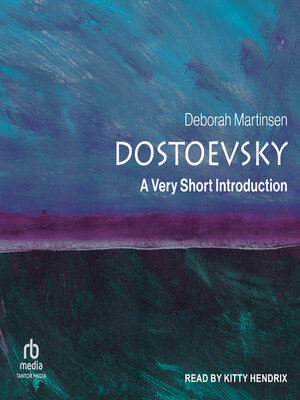
Sign up to save your library
With an OverDrive account, you can save your favorite libraries for at-a-glance information about availability. Find out more about OverDrive accounts.
Find this title in Libby, the library reading app by OverDrive.



Search for a digital library with this title
Title found at these libraries:
| Library Name | Distance |
|---|---|
| Loading... |
Fyodor Dostoevsky became the writer best known for his treatment of the big questions of ethics, religion, and philosophy.
In this Very Short Introduction, Deborah Martinsen explores Dostoevsky's tumultuous life story: his political imprisonment and narrow escape from execution, his Siberian exile, his gambling addiction, his romantic marriage, and his literary success. Martinsen also delves into his major works—Notes from Underground, Crime and Punishment, The Idiot, Demons, The Brothers Karamazov, The Diary of a Writer, and more. Each chapter analyzes a key theme or aspect of Dostoevsky's writing that showcases his profound insights into human nature and society: doubling, freedom, shame, social justice, scandal, aesthetics, ethics, faith, and the eternal questions. Martinsen also demonstrates how Dostoevsky's novels remain relevant today as they address pressing questions about freedom, morality, and meaning in a complex world.
In this Very Short Introduction, Deborah Martinsen explores Dostoevsky's tumultuous life story: his political imprisonment and narrow escape from execution, his Siberian exile, his gambling addiction, his romantic marriage, and his literary success. Martinsen also delves into his major works—Notes from Underground, Crime and Punishment, The Idiot, Demons, The Brothers Karamazov, The Diary of a Writer, and more. Each chapter analyzes a key theme or aspect of Dostoevsky's writing that showcases his profound insights into human nature and society: doubling, freedom, shame, social justice, scandal, aesthetics, ethics, faith, and the eternal questions. Martinsen also demonstrates how Dostoevsky's novels remain relevant today as they address pressing questions about freedom, morality, and meaning in a complex world.







